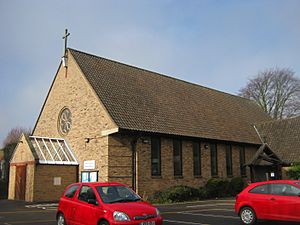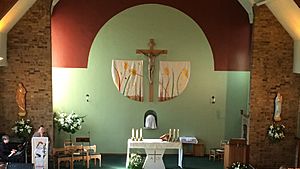St Laurence's Church, Cambridge facts for kids
Quick facts for kids St Laurence's |
|
|---|---|
| St Laurence's Roman Catholic Church | |
 |
|
| 52°13′05″N 0°07′46″E / 52.218145°N 0.129572°E | |
| Location | 91 Milton Road, Cambridge, CB4 1XB |
| Country | United Kingdom |
| Denomination | Roman Catholic |
| Architecture | |
| Years built | 1958 |
| Administration | |
| Diocese | East Anglia |
The Church of St Laurence is a Roman Catholic church in Cambridge, England. It is named after Saint Laurence of Rome. This church is part of the Diocese of East Anglia. It is one of three Catholic churches that serve the city of Cambridge. The other two are Our Lady and the English Martyrs and St Philip Howard.
Contents
History of St Laurence's Church
Early Catholic Churches in Cambridge
The first permanent Roman Catholic church in Cambridge after the Reformation was Our Lady and the English Martyrs. It opened on October 8, 1890. As the number of Catholic people grew, a new place of worship was needed.
In 1923, a Carmelite convent opened on Chesterton Road. This provided a new church for Catholics in the northern part of Cambridge.
Moving to a New Location
In 1937, the Carmelite sisters moved to a quieter place in Waterbeach. After they left Cambridge, people realized a new parish was needed. Within a year, a generous donation of £250 was given. This money helped start a new church for Catholics in Chesterton.
The Temporary "Tin Tabernacle"
After the Carmelite sisters left, church services were held in private homes. Later, a small church made of corrugated iron was built on High Street in Chesterton. This type of building is sometimes called a "tin tabernacle."
In 1947, this iron church became the new Parish of St Laurence's. The priest lived nearby on Ferry Lane.
Building the Permanent Church
When Rev. Patrick Oates arrived in 1951, efforts to raise money for a permanent church sped up. On March 8, 1958, Bishop Parker laid the first stone for the new church. This new church was built on Milton Road.
On August 24, 1958, the new St Laurence's Church was officially blessed and opened. The old corrugated iron church building had an interesting past. It was once part of a hospital during the First World War. After the war, it was moved and used as a church. After the new church opened in 1958, the old iron church was moved again. It became the Church of St Vincent de Paul in Fen Ditton.
Architecture and Appearance of the Church
St Laurence's is a modern church. It is built with brick and has an open design. This open layout allows everyone in the church to easily see the altar area.
The church has mostly stayed the same since it opened. Some changes were made after the Second Vatican Council. For example, the altar rails were removed, and the altar area was redesigned. Around the year 2000, the porch was updated with a glass roof to let in more light. In the early 2000s, a balcony was added at the back of the church. This helped create more space for the growing number of people attending services.
Parish Priests and Clergy
A parish priest is the main priest in charge of a church community. Here are the priests who have led St Laurence's Church:
| Parish Priest | Dates |
|---|---|
| Rev Gerard Hulme | 1947–1951 |
| Rev Patrick Oates | 1951–1968 |
| Rev Callum Weir | 1968–1969 |
| Rev Liam Brady | 1969–1972 |
| Rev John Drury | 1972–1977 |
| Rev Richard Wilson | 1977–1982 |
| Rev Peter Wynekus | 1982–1988 |
| Rev Michael Griffin | 1988–1996 |
| Rev David Paul | 1997–2011 |
| Canon Patrick Cleary | 2011–2018 |
| Canon Simon Blakesley | 2018-2024 |
| Rev Robin Mampallithadathil CRM | 2025- |
Many other priests have also helped serve the parish over the years. These include Revs Peter Stoyle, Paul Hypher, Derrick Morgan, Timothy Russ, Francis Selman, Michael Vulliamy, Joseph Farrell, Fr Bob Eccles, and Rev Simon Davies. Rev Alex Vadasseril CRM became an assistant priest in 2025.
The parish has also had permanent deacons, such as Rev Geoffrey Cook, who started serving in 1978.
Parish Statistics
St Laurence's Church keeps records of its community. These records include the number of baptisms (for children), receptions (when adults join the church), and marriages. They also count how many people attend Sunday mass each year. These numbers help the church understand its growth and how many people are part of its community.
 | Claudette Colvin |
 | Myrlie Evers-Williams |
 | Alberta Odell Jones |


